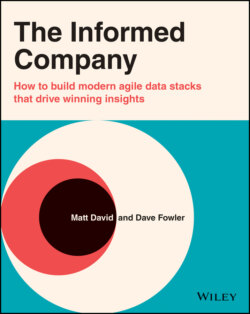Читать книгу The Informed Company - Dave Fowler - Страница 11
Foreword
ОглавлениеIn 2015, I used a product called Amazon Redshift. At the time, I had spent the prior 15 years of my career in a variety of roles all centered around their use of data, from analytics to marketing to operations. And while I considered my data competency my biggest professional differentiator, I had also become deeply frustrated. For all of the supposed progress in the data ecosystem, it was still slow, hard, and expensive to get insights out of data.
But my first experience with Redshift is where that all changed for me. I have such a visceral memory of the first hour I spent with the product: queries I ran returned so fast that it seemed like absolute magic. I had spent years and years of my career writing queries and waiting for the MacOS “spinner” icon to stop spinning. Now, all the sudden, these same queries weren’t 20% faster…they were 10 to 100 to 1000x faster. I felt like I had superpowers.
I'll let Dave and Matt actually explain how the modern data warehouse can achieve these types of performance results, but for now, just trust me that it can and does. Given that, the fascinating question is actually: what does this mean for people like you and me?
What kind of “people” do I mean? You know—people who are involved in making decisions at companies and want to use data to help us. People who likely over the years have acquired a variety of data skills, whether that's Excel VLOOKUPs, Google Analytics dashboards, SQL, or any of a thousand other options. People who have always felt like it shouldn’t be so hard to do basic stuff when it comes to data (but of course, for some reason, it always has been).
What I've come to realize in the years since my initial experience with Redshift is that the modern data stack has exactly two very important impacts for us:
1 With this far better tooling, we can grow our impact on the organizations we work for dramatically. I'm going to say something really stupid and obvious, but: if your queries return 100x faster, you can know 100x more stuff. And that means that you'll just be tremendously more valuable in the insights you're able to provide and the decisions you can make.
2 As a result of #1, our career options are just far, far greater. When I started my career, “data analyst” was a junior position that you attempted to graduate out of as quickly as possible to move onto other things. Now data analysts are high‐leverage, strategic employees with earning potential that mirrors that of software engineers.
There really has been a change in what a single analyst is able to accomplish with some fairly simple tooling and some very accessible knowledge and skills. That single individual can now construct an entire sophisticated data infrastructure by plugging together some inexpensive off‐the‐shelf tools, and then get to work getting insights. Or, that individual can operate as an integral part of a large and sophisticated data team, forming a part of the nervous system for the modern enterprise. The same technology, same skill sets, same knowledge is required regardless how big or small the organization.
This is the modern data stack. To harness its power, you need to know SQL (learnable a day!) and you need to know some basic best practices that folks like the authors of this book have been deep in the weeds developing and recording over the past half‐decade. It's surprisingly achievable—one of the magical things about these tools is just how little advanced technical knowledge is required.
This book provides the foundational knowledge you'll need to navigate the modern data stack. From there, you'll be able to dive in yourself, get your hands dirty, and start asking questions of your fellow practitioners. And when you do, make sure to head over to join me in the dbt Community—my Slack handle there is @tristan and I'd love to hear from you!
